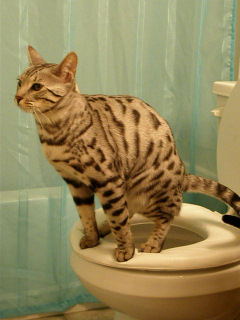Potential Risks of Flushing Cat Poop Down Your Toilet - Tips for Better Disposal
Potential Risks of Flushing Cat Poop Down Your Toilet - Tips for Better Disposal
Blog Article
Have you been interested in information and facts concerning Don’t flush cat feces down the toilet?

Introduction
As pet cat proprietors, it's essential to be mindful of just how we take care of our feline pals' waste. While it might seem hassle-free to flush feline poop down the commode, this method can have harmful repercussions for both the atmosphere and human health.
Alternatives to Flushing
Thankfully, there are more secure and a lot more liable ways to deal with cat poop. Consider the complying with choices:
1. Scoop and Dispose in Trash
The most common method of getting rid of pet cat poop is to scoop it right into a biodegradable bag and toss it in the trash. Make sure to make use of a devoted litter inside story and throw away the waste without delay.
2. Use Biodegradable Litter
Opt for naturally degradable feline trash made from materials such as corn or wheat. These trashes are eco-friendly and can be safely taken care of in the trash.
3. Hide in the Yard
If you have a yard, consider hiding pet cat waste in a marked location far from vegetable yards and water sources. Be sure to dig deep sufficient to prevent contamination of groundwater.
4. Set Up a Pet Waste Disposal System
Buy an animal waste disposal system especially made for feline waste. These systems utilize enzymes to break down the waste, lowering smell and ecological impact.
Health Risks
Along with ecological concerns, flushing cat waste can also posture wellness risks to human beings. Pet cat feces might contain Toxoplasma gondii, a bloodsucker that can cause toxoplasmosis-- a potentially extreme health problem, particularly for pregnant ladies and people with damaged immune systems.
Ecological Impact
Purging feline poop presents unsafe microorganisms and parasites into the water system, positioning a considerable threat to water ecosystems. These contaminants can adversely influence marine life and compromise water quality.
Conclusion
Accountable pet possession prolongs past giving food and sanctuary-- it likewise entails proper waste administration. By refraining from purging feline poop down the commode and opting for alternate disposal methods, we can reduce our ecological impact and safeguard human wellness.
Why You Should Never Flush Cat Poop Down the Toilet
A rose by any other name might smell as sweet, but not all poop is created equal. Toilets, and our sewage systems, are designed for human excrement, not animal waste. It might seem like it couldn’t hurt to toss cat feces into the loo, but it’s not a good idea to flush cat poop in the toilet.
First and foremost, assuming your cat uses a litter box, any waste is going to have litter on it. And even the smallest amount of litter can wreak havoc on plumbing.
Over time, small amounts build up, filling up your septic system. Most litter sold today is clumping; it is made from a type of clay that hardens when it gets wet. Ever tried to scrape old clumps from the bottom of a litter box? You know just how cement-hard it can get!
Now imagine just a small clump of that stuck in your pipes. A simple de-clogger like Drano isn’t going to cut it. And that means it’s going to cost you big time to fix it.
Parasitic Contamination
Believe it or not, your healthy kitty may be harboring a nasty parasite. Only cats excrete Toxoplasma in their feces. Yet it rarely causes serious health issues in the cats that are infected. Most people will be fine too if infected. Only pregnant women and people with compromised immune systems are at risk. (If you’ve ever heard how women who are expecting are excused from litter cleaning duty, Toxoplasma is why.)
But other animals may have a problem if infected with the parasite. And human water treatment systems aren’t designed to handle it. As a result, the systems don’t remove the parasite before discharging wastewater into local waterways. Fish, shellfish, and other marine life — otters in particular — are susceptible to toxoplasma. If exposed, most will end up with brain damage and many will die.
Depending on the species of fish, they may end up on someone’s fish hook and, ultimately on someone’s dinner plate. If that someone has a chronic illness, they’re at risk.
Skip the Toilet Training
We know there are folks out there who like to toilet train their cats. And we give them props, it takes a lot of work. But thanks to the toxoplasma, it’s not a good idea.

We had been shown that editorial about Don’t flush cat feces down the toilet from an associate on a different web property. Sharing is caring. You just don't know, you may just be doing someone a favor. Thanks for taking the time to read it.
Hire A Pro Report this page